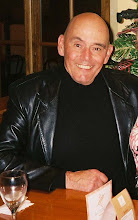– Guest post by Denis Campbell, editor of www.vVadimusPost.com
Britons call him “THE” playwright. Americans recognise her more as Catwoman on the TV version of Batman than as the sexy singer who turned heads long into her 70s. Nobel laureate ‘Sir’ Harold Pinter and music legend Eartha Kitt passed away within hours of each other Christmas Day.
We are all the poorer.
Some argue because he turned down his Knighthood in 1996 and the awarding of a CBE in 2002, means he cannot be called ‘Sir.’ But he was always a grand knight of the modern theatre. His body of work includes The Room, The Birthday Party and film’s The French Lieutenant’s Woman. They were filled with arching dialogue and gripping characters. An actor himself, he enjoyed honing his craft on the live stage.
His massive body of work – some 30 Broadway plays – and fervent anti-war activism, earned him a Nobel Prize for Literature in 2005 for his collection Death, Etc. Pinter’s language precision is immensely political. He twists words like “democracy” and “freedom,” as he believes Blair and Bush did over Iraq, and hundreds of thousands of people die. When he was presented with the European Theatre Prize in Turin in early 2006, Pinter said he intended to spend the rest of his life railing against the United States.
“Surely,” asked chair Ramona Koval, he was “doomed to fail?”
“Oh yes – me against the United States!” he said, laughing along with the audience at the absurdity, before adding: “But I can’t stop reacting to what is done in our name, and what is being done in the name of freedom and democracy is disgusting.”
Eartha Kitt grew up on a cotton plantation in segregated Columbia, SC. Orson Welles called her “the most exciting woman in the world” and I agree. All it ever took was one deep, sultry, throaty note and you knew you were about to called into her seductive musical world. She teased men and women alike with a blend of raw sexuality that was as unexpected as it was forbidden on stage and television in the 1950s and Sixties. When she donned the skin-tight Catwoman suit, she literally became a cat with her entire being, bringing an otherwise staid cartoon character to life.
As a mixed race child in the south – her father was German/Dutch and Kitt claimed her mother was raped – she did not belong, being ostracised and segregated from both black and white cultures growing up in the 1930s and ‘40s. If anyone understood the confusion Barack Obama experienced during the early days of the presidential race it was Eartha Kitt. During the campaign she confessed a fondness for Obama: “He’s Afro-American and seems rather intelligent.” But experienced enough to be president? “All those guys in the White House now were experienced, and what are they doing?”
Kitt vaulted to prominence during an appearance on Broadway in Orson Welles' Time Runs. She played Helen of Troy and the performance – along with a torrid affair with Welles – saw her tapped for the Broadway review New Faces of 1952 where her number Monotonous stole the show. A record contract with RCA Victor soon followed and her career was off like a rocket.
Harold Pinter’s body of work was long, deep and steady.
He rose to amazing heights and The French Lieutenant’s Woman won him a BAFTA but, sadly, he was closed out of his best chance for an Oscar that year by another British entry, Chariots of Fire. While Pinter has seemed to be in the wrong place at the wrong time, his work on one of my personal favourites, Reunion with Jason Robards, was deserving of awards but, like his other works, always seemed just a hair over the heads of the Academy.
Even his 2007 film remake of Peter Shaffer’s play Sleuth left many folks scratching their heads. The story is about a millionaire detective novelist who matches wits with the unemployed actor (who also ran off with his wife) in a deadly serious twisted game. Unlike the original, it was much darker and contained sparse, cryptic language, significant pauses and, as always, a hint of menace beneath the surface.
In 1968 Ms. Kitt was essentially blacklisted by Lyndon Johnson. She was invited by Lady Bird to a celebrity women’s luncheon at the White House and asked to offer her views on inner-city youth. Taking the event seriously, not as a publicity stunt, Kitt pointedly criticized the Vietnam War and its impact on poor minorities.
An infuriated Johnson put out the word that Kitt’s rudeness reduced the First Lady to tears and Kitt found herself essentially blacklisted across the country. Afraid to incur the government’s wrath, venues refused to book her. It was later revealed Kitt was the subject of a secret federal investigation; her house bugged and she was tailed by Secret Service agents. When the FBI failed to find evidence Kitt was a subversive, the CIA compiled a highly speculative dossier that attempted to portray her as a nymphomaniac. Unable to find work in America, Kitt moved to Europe where she spent most of the following decade.
I was blessed to meet both of them briefly after standing patiently outside a stage door in London in 1978 and New York a few years earlier where two long since lost Playbills were signed by two very gracious and obviously exhausted people.
So, raise a glass of Wassail to the memory of two legends, dancing now together and, as fate would have it, two passionately progressive antiwar voices on two sides of the Atlantic silenced. Rest in the peace that you always stayed true to yourselves and to the rest of us who will miss you.
Tom Degan
1958-2023
To all Tom’s faithful readers of the Rant, we are sad to announce that he
passed away on December 7th, 2023. Thank you so much for th...


No comments:
Post a Comment